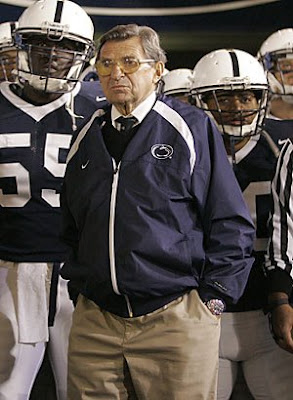Baltimore Sun
December 7, 2007

Jay Gibbons is congratulated by third base coach Juan Samuel after his three-run home run in the sixth inning gave the Orioles the lead for good at 3-2. Gibbons added a two-run single in the seventh inning. (AP photo / July 17, 2007)
Presumably, any day now George Mitchell will release a scathing report on steroids in baseball that will either eternally restore our faith in the national pastime or shock us all into moving to Ottawa and becoming NHL fans. But there's a slight problem with this premise: As far as shock goes, baseball has successfully waited out our attention span.
Steroids, human growth hormone, amphetamines, the cream, the clear, equine Viagra - it's all pushed to the very back of my mind's medicine cabinet. Mitchell can't possibly produce a guilty name that will generate any surprise or disbelief.
Barry Bonds? Zzzzzzz.
Eddie Gaedel? Perhaps no one needed more help in the growth department.
Elmo? The red fur never struck me as natural.
What's most bothersome now has less to do with cheating the game and so much more with cheating our collective sensibilities. Yesterday's news that Orioles outfielder Jay Gibbons faces a 15-day suspension for violating Major League Baseball's substance-abuse policy was hardly a surprise. But Gibbons' admission that he purchased and used hGH should have stirred deeper feelings for fans.
He's an excellent example of why fans have built up so much distrust, why it's so difficult to look at a man or woman capable of superhuman athleticism and feel that innocent sense of awe bubble inside. Gibbons' actions are disappointing, but his words are much more damaging.

Orioles outfielder Jay Gibbons is greeted by cather Geronimo Gil upon arriving at the team's spring training camp on Monday. (Sun photo by Doug Kapustin / February 21, 2005)
Here's the nickel tour through the Jay Gibbons Lie, as told by Jay Gibbons:
March 2004: Reports surface that Bonds, Gary Sheffield and Jason Giambi have received performance-enhancing substances, and Gibbons opined: "It's kind of like people are being convicted before they're even tested. Nobody knows who did what, you know what I mean? And it's really frustrating for a guy who works so hard, just to be accused of something."
August 2005: One day after teammate Rafael Palmeiro is suspended, Gibbons says: "Not one person has come out and said, 'Yeah, I took steroids.' I don't know, is everybody telling the truth? Something's got to give here eventually."
November 2005: After Major League Baseball and the players union announce new, stiffer penalties: "We want to end the problem now and get back to playing ball and not worrying about steroids every day."
October 2006: After the Los Angeles Times reports that former teammate Jason Grimsley has fingered Gibbons, among others, as a steroid user, he says: "I have passed every test administered by Major League Baseball over all the years. I have never taken anabolic steroids. And I am not going to dignify these claims and accusations with any further response."
Yesterday: "I am deeply sorry for the mistakes that I have made. I have no excuses and bear sole responsibility for my decisions. Years ago, I relied on the advice of a doctor, filled a prescription, charged the hGH, which is a medication, to my credit card and had only intended to help speed my recovery from my injuries and surgeries."

Orioles right fielder Jay Gibbons sprints onto the field during opening ceremonies. (Sun photo by John Makely / April 3, 2006)
Perhaps the reaction would have been different if he were among the first busted offenders, but as it is - Gibbons is one of eight players connected to the Orioles to be tied to performance-enhancing drugs - what feels especially repulsive today is his parallel career of lying.
Gibbons walked around the clubhouse with a body that was supposed to be chiseled in the gym, not over the counter. The steroid witch hunt unfairly chased after the game's bulky gym rats, Gibbons said, and he promised us time and time again that his statuesque physique was solely the product of an incredible work ethic.
We wanted to believe him, mostly, I suppose, because Gibbons seems like a decent guy. He was the clubhouse union rep. He attended chapel before Sunday games. He rode an inspiring underdog story into the starting lineup, and both he and his wife constantly gave back to the community. He treated reporters, teammates and fans with respect and appreciation.
Which is exactly why the lying and the hypocrisy are so damaging.
Gibbons was one of the good guys, and if the good guys are cheating and able to look us in the eye and lie, what does that really say about the game? And its athletes?
And what does it really say about the rest of us?
Steroids, hGH, cheating - it's all offensive. The lying, however, that's insulting. It's the way a fraud tells you, "You're too stupid to figure out the truth."
And in retrospect, the game's grifters are right. Anyone today still willing to take a baseball player at his word is, in fact, pretty stupid.
Gibbons' admission yesterday didn't sully his reputation; that disappeared when the accusations, injuries and declining statistics bowled over his career. It might not be fair, but what Gibbons has done is cast doubt on every other ballplayer from this point forward who tries to sell us on his innocence. Sorry, we're done buying it.
More names are coming. Mitchell's report drops any day now. But don't expect any shock. Just disappointment from here on out.
We've all lost some innocence here. But it's the game of baseball that moves forward, and no matter what Mitchell finds, there aren't many innocents left.
rick.maese@baltsun.com




















